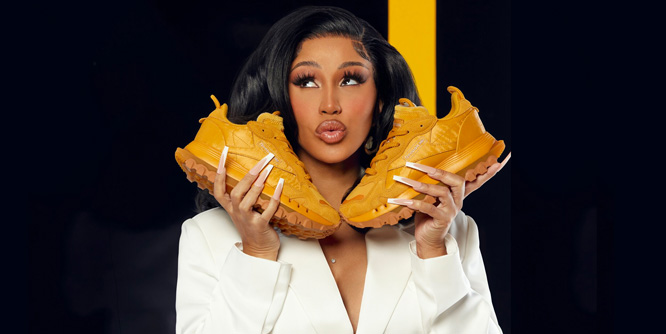
Photo: ABG/Reebok
What’s next for Reebok after leaving Adidas?
Reebok is getting another chance to recapture its past glory under new ownership by Authentic Brands Group (ABG) after nearly 15 years of floundering under Adidas.
The brand’s heyday dates back to the eighties with the launch of what many see as the first athletic shoe designed specifically for women, the Freestyle, tied to the Jane Fonda-inspired aerobics craze.
Successes with the Philadelphia 76ers’ legend Allen Iverson’s shoe and Pump inflatable technology followed. The brand was far ahead of the current trend of driving sneaker sales through pop culture. Cybill Shepherd wore a bright orange pair of Freestyles to the Emmys in 1985 and the brand forged early partnerships with hip-hop stars Jay-Z and 50 Cent.
Reebok surpassed Nike as the number one athletics brand by 1986. Sales peaked at $3.2 billion in 2004, but shrank to $1.4 billion by 2020.
Sales were already slowing prior to the 2006 Adidas acquisition but were also negatively affected by the transition of the NBA license to Adidas in 2006 and the loss of the NFL license to Nike in 2012. Reebok exited team sports categories, including basketball, to focus on fitness, with the move marked by a partnership with the Crossfit martial arts organization.
Reebok faced newer competition in fitness from Lululemon and Under Armour and had to take shelf space from Nike and Adidas, its sister brand. The retro craze that accelerated growth in recent years for Champion and Fila also largely missed Reebok.
Reebok returned to profitability in 2018, but sales have remained sluggish despite high-profile collaborations with Cardi B, Kendrick Lamar and Ariana Grande.
As it typically does, ABG, which has acquired stakes in recent years in Forever 21, Aéropostale, Lucky Brand, Barneys, Brooks Brothers, Eddie Bauer and other consumer brands, plans to secure a prominent licensing partner to reposition Reebok for growth.
Neil Saunders, manager director at Global Data and a RetailWire BrainTrust panelist, believes Reebok shouldn’t focus on going head to head with Nike. “The market remains extremely competitive so coming up with a differentiated offer that has clear customer focus and a strong distribution strategy will be key to future success,” he wrote in a note.
- Adidas To Sell Reebok To Authentic Brands Group – Adidas
- ABG to Acquire Reebok – Authentic Brands Group
- Adidas Agrees to Sell Reebok to Authentic Brands – The Wall Street Journal
- Adidas sells Reebok to Authentic Brands for $2.5 billion. – The New York Times
- Salter Talks Reebok’s New Biz Model – WWD
- Escaping Adidas Is The Best Thing That Could Happen To Reebok – High Nobiety
- Adidas ends Reebok era with $2.5 bln sale to Authentic Brands – Reuters
Discussion Questions
DISCUSSION QUESTIONS: How should Reebok be repositioned for growth under ABG’s ownership? What lessons do the struggles Adidas faced reviving Reebok’s growth provide?


ABG, with no real stake in the athletic category, could be exactly what Reebok needs to infuse new life into the brand.
A closer look at the brand messaging and what the loyal Reebok customer is looking for could give the brand another chance to make a mark on the performance/athletic industry. It comes down to the product strategy and a clear understanding of who and what Reebok stands for.
This is a chance for Reebok to get it right.
I think the main opportunity for Authentic Brands is to both sell Reebok directly to consumers but also to push the brand via its other retail outlets and third-party retailers. Authentic Brands has been skilled in doing this and with Nike withdrawing from many retailers, there is a gap to be filled if Authentic Brands can come up with a compelling proposition. All that said, I don’t think the focus should be on Reebok competing with Nike. That is what Adidas intended and it largely failed. Reebok should look to do something different and target different niches and customer demographics – perhaps a focus on older consumers.
One thing I learned when I was in the shoe business is that it’s very cyclical. Styles and brands go in and out of fashion. One day we give a brand up for dead, the next day it’s flying high. Then the whole category got overtaken by hiking shoes. Just look at Converse’s saga. The industry is just very, very cyclical.
As Liza said, re-establish what the brand stands for and then be a bit patient. That’s likely easier said than done, but I’ve been around the shoe space for a long time, and a dear friend and merchant gave me that sage advice about 20 years ago. She has proven to be correct.
I think the lesson is it’s difficult, if not actually impossible, to do two things at once; there will always be a tendency for a company to favor its own brand, no matter how much effort is made at equity toward the acquisition (how much such effort was actually made under Adidas I don’t know).
As for ABG, they’ve put a lot on their plate; I’ll defer judgement until they actually do something … or it becomes clear that they can’t.